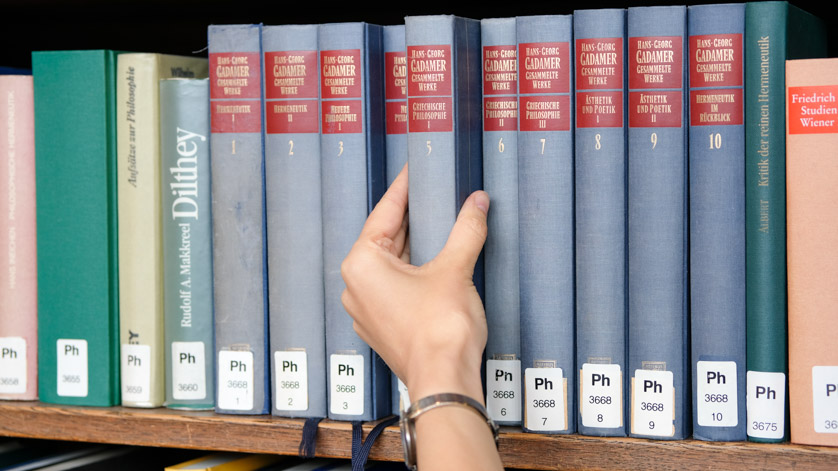Why can’t I take food, beverages and cosmetics into the reading room?
Leaking fluids or residue from food and cosmetics such as the fats in creams, bread and butter or chocolate can damage media works permanently or at least necessitate costly repairs.
While you are in the reading room, please use the lockers to store food and beverages and cosmetics such as hand creams, lipsticks or perfume.
Is there an alternative to sticky notes and adhesive bookmarks?
Yes, we provide bookmarks and insert strips in our reading rooms and at our issues desk that you can use when working with our media. The glue on sticky notes can leave a residue, degrading the paper or causing pages to stick together.
Please do not fold page corners down; this is more than just a visual annoyance. The structure of the paper is damaged at the crease. As the media work ages, the corner may then tear or fall off even when the page is turned carefully. This damage must then be corrected by means of a complex conservation procedure.
Can I use paper clips as bookmarks?
Metal paper clips can rust quickly. Sometimes the moisture of our hands is enough to make this happen. Moreover, paper clips – no matter what material they are made of – press into the paper and can therefore cause mechanical damage. Please use our bookmarks and insert strips instead of paper clips.
A book won’t stay open – what can I do?
If a book won’t stay open at the page you are reading, you can ask for book weights at the issues desk. Book weights are weighted cords that you can place on the page. They keep the page open without damaging the binding.
Please don’t press the book flat with your hand. This often damages the binding.
If a book is especially thick or only stays open at a 90° angle, you can ask for foam wedges at the issues desk. These form an angle that supports the book and keeps it open. You can also use book weights.
Foam wedges and book weights are available free of charge at the issues desk for use in the reading rooms.
The media work I am using consists of several parts – what should I take note of?
Please make sure that the individual parts are not separated from the media work. Return single pages, maps or other enclosures to the media work after use. All users should have the opportunity to view the media work in its entirety.
Can I keep documents and media together with rubber bands?
Unfortunately, no. The advantage of rubber bands is also their disadvantage. As long as the softeners in the rubber bands keep them elastic, they contract until the resistance offered by the object is greater than the tensile force in the rubber band. This places the objects in our collection doubly at risk:
- rubber bands often sit tightly around the media they are holding together. This can easily result in tears or creases. Older papers in particular are often thinner or more brittle at the edges than in the middle, as harmful influences such as warmth, sweat or grease can accelerate decay.
- The softeners in rubber bands can quickly make them sticky. The rubber band may then stick to the binding and damage it.
I would like to use a pen while I’m reading – am I allowed to do this?
Besides causing visual flaws, pen and pencil marks can damage the paper. They may contain harmful substances such as solvents or acids. It is therefore essential that you refrain from making marks or entries in our media works.
We place scanners at your disposal in our reading rooms. With these, you can copy your texts and then use your pencil when reading the copy.
What equipment can I use to transport tall or heavy stacks of media?
Safely in two hands or on four wheels: if you want to use several books at your workstation, please take only as many as you can comfortably carry in two hands. In this way, you can make sure that they don’t accidentally fall on the floor.
If you have ordered
• books that are large, heavy or printed in a large format,
• index cards,
• archive boxes or
• files containing loose leaves,
or if health problems make it impossible for you to lift heavy weights, we will gladly place a book trolley at your disposal free of charge.
You can then safely transport the media works to your table on four wheels provided you load the trolley in such a way that
• books and periodicals are arranged flat on the trolley in several small piles,
• the trolley is evenly loaded (it is better to position heavy, large-format books towards the side of the trolley where the handle is),
• none of the media can fall out, and
• you can push the trolley easily.
What is the most careful way to remove books from shelves in the reading room?
If you wish to take a book off a shelf in the reading room, first push the neighbouring books towards the back. In this way, you can easily grasp the sides of the book with your thumb and index finger to pull it out. This prevents you having to pull the book out by the spine, which can easily cause it to tear. Alternatively, you can remove the book by grasping the section near the back of the shelf and pushing it forwards slightly.
I have accidentally damaged a media work. What should I do?
If you have accidentally damaged a media work, please notify the staff at the issues desk. Never try to correct damage yourself. Damage to media works is treated by our collection preservation department after the damage has been analysed in detail and the conservational requirements have been determined.


